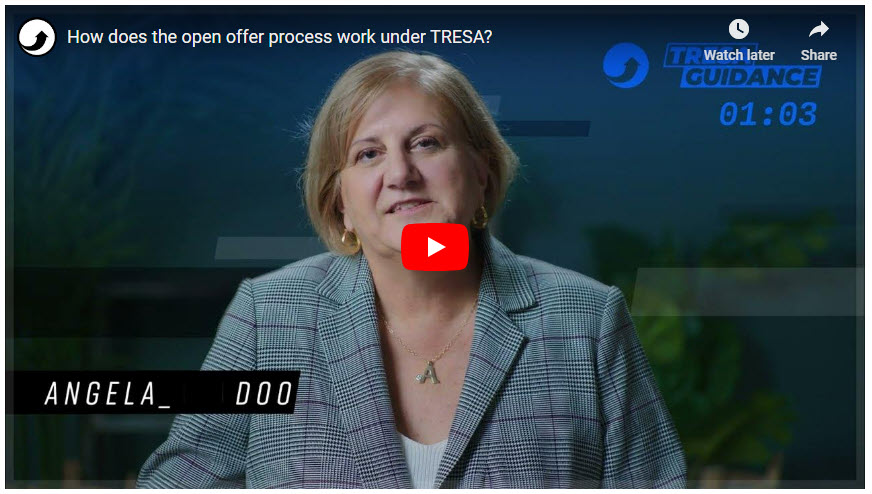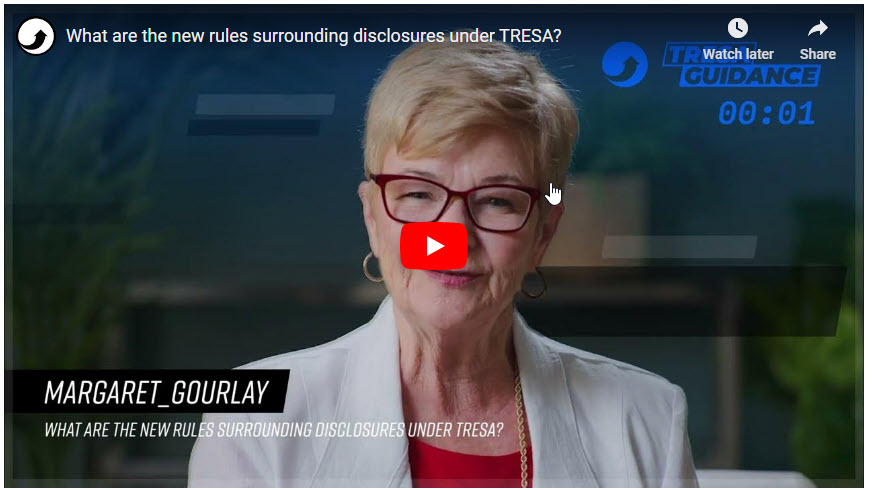Significant Changes to Ontario Real Estate: What you need to know
Explore the transformative landscape of Ontario real estate with TRESA Phase 2, effective from December 1, 2023. Uncover essential changes impacting buyers, sellers, and real estate professionals, emphasizing transparency, protection, and ethical considerations. From designated representation to the Open Offer Process, this guide navigates the intricacies, ensuring everyone involved is well-informed for a seamless real estate experience.
The Government of Ontario has implemented the second phase of TRESA regulations, which occurred on December 1, 2023. This guidance provides information on incorporating these changes into the operations of REALTORS® and brokerages.
Significant changes have come to the Ontario real estate market that will affect buyers, sellers, and the real estate professionals who work with them. The direction of these changes seeks to help streamline the buying and selling process, make it easier for all involved and ensure more transparency in transactions.
At the heart of the changes is greater protection for buyers and sellers by improving communication between parties and providing more oversight of real estate contracts.
These changes include requiring a Realtor to act in their client’s best interests, clarify disciplinary consequences of Agents, increase disclosure requirements when offering a property for sale, reinforce cancellation rights when presenting offers on properties and receive statements of material facts upon purchase. These changes hope to ensure an even better home buying or selling experience for Ontarians.
REBBA to TRESA – A new phase in the Real Estate Services Act
The Trust in Real Estate Services Act (TRESA) is set to replace the old Real Estate and Business Brokers Act (REBBA) on December 1, 2023. These changes are being made to ensure transparency and empower consumers and real estate professionals by ensuring they have access to the most up-to-date information, including sharing of relevant market data, updates on listings, additional safeguards for consumers when working with agents, improved valuation services, and increased powers for regulators to enforce compliance with standards.
These changes will help give everyone involved in buying or selling property a fair chance to come out ahead. Many of the protections absent from REBBA have been built into TRESA, resulting in a more seamless experience for all parties and giving home buyers assurance that they’re getting an accurate assessment of their property’s value before negotiating a sale or purchase agreement.
With these new rules in place, all parties should feel more confident when dealing with legal aspects of real estate transactions. In essence, this development will be met with great anticipation by those involved in real estate transactions as it marks a shift towards greater consumer protection across the industry.
TRESA Multiple and Designated Representation
 When considering TRESA Phase 2, Designated Representation is important to understand. This type of agreement means that two agents from the same brokerage can represent the buyer and the seller in a single transaction.
When considering TRESA Phase 2, Designated Representation is important to understand. This type of agreement means that two agents from the same brokerage can represent the buyer and the seller in a single transaction.
This means there’s no need to choose between multiple or designated representations, but the type of agreement must be decided at the beginning of each deal. Furthermore, under Designated Representation, the brokerage remains neutral but keeps an eye out for both agents doing their jobs.
For example, consider if you are selling your house and hire a real estate agent from ABC Realty. In this case, ABC Realty has two agents; Jane and Mark. If you choose a Designated Representation scenario, then Jane and Mark would represent both the buyer and seller.
At this point, it is important to note that by choosing Designated Representation, ABC Realty will remain neutral but ensure that Jane and Mark fulfill their duties as best they can until the closing day arrives!
Can Buyers or Sellers Act as Self-Represented Parties in Real Estate Transactions?
 In a real estate transaction, a “self-represented party” is an individual who engages in the process without the representation of a real estate agent or brokerage. Essentially, they are not affiliated with any brokerage and manage the transaction independently, devoid of the guidance and services typically provided by a realtor.
In a real estate transaction, a “self-represented party” is an individual who engages in the process without the representation of a real estate agent or brokerage. Essentially, they are not affiliated with any brokerage and manage the transaction independently, devoid of the guidance and services typically provided by a realtor.
Self-represented parties assume the responsibilities of negotiating transaction terms, comprehending legal and financial aspects, and completing necessary paperwork without the professional aid of a real estate agent. This designation distinguishes those who do not seek representation from a real estate professional when buying or selling a property.
Traditionally, there was a distinction between “clients” and “customers.” However, to eliminate any confusion, TRESA phase 2 replaces “customer” with “self-represented party.” This terminology denotes someone who operates without the assistance of any brokerage, and realtors cannot provide services or advice to such individuals.
Sharing Offer Contents under TRESA
 A notable shift under TRESA involves the ability to share the content of competing offers, offering more transparency in real estate transactions.
A notable shift under TRESA involves the ability to share the content of competing offers, offering more transparency in real estate transactions.
While REBBA mandates informing buyers about the number of competing offers, TRESA introduces a new provision. Realtors are now allowed to share the contents of offers with every buyer who submits an offer, provided it is at the seller’s written direction.
The seller holds the authority to decide which content is shared, ensuring that no personal information of the offeror is disclosed. Examples of such personal information include the buyer’s name or the address of the buyer’s property if applicable.
It’s crucial to understand that seller’s agents are not obligated to make a decision on sharing offer contents when the property is listed or later than the presentation of offers. Consequently, buyers’ agents should inquire with their clients about their preferences regarding the potential sharing of their offer details.
If a buyer opposes the disclosure of their offer terms, the realtor may recommend including a condition in the offer to address this concern. This provision allows for greater flexibility and consideration of the preferences of both buyers and sellers in the real estate negotiation process.
What happens if a seller changes their mind during an open offer transaction?
Written Agreements and Disclosures in Real Estate Transactions
 In adherence to TRESA regulations, any services committed to clients, such as commission, referral fees, or staging, must be explicitly outlined in the written agreement. However, one of the most significant shifts under TRESA is the new requirement for Realtors to assist sellers in disclosing known facts to potential buyers.
In adherence to TRESA regulations, any services committed to clients, such as commission, referral fees, or staging, must be explicitly outlined in the written agreement. However, one of the most significant shifts under TRESA is the new requirement for Realtors to assist sellers in disclosing known facts to potential buyers.
Traditionally, buyers bore the responsibility of being vigilant and investigating properties independently during a real estate purchase, with sellers obligated to disclose only significant hidden defects that rendered the property unsafe or uninhabitable.
Effective December 1, 2023, TRESA introduces a game-changing provision. It mandates that if a seller has a legal duty to disclose information to the buyer, and the seller’s agent is aware of it, the agent is obligated to communicate this to every interested buyer.
For instance, if a pre-listing inspection uncovers a concealed issue, both the seller and their agent are now required to share this information with potential buyers and their agents. This shift implies a potential decrease in pre-listing inspections, prompting sellers to exercise caution, and fostering greater transparency in real estate transactions.
From the seller’s perspective, crucial information that might have otherwise remained unknown—had it not been for an inspection or if the inspection report had gone solely to their lawyer, who might choose not to share it—now becomes an integral part of the disclosure process.
Consumer Information Guide
 The Real Estate Council of Ontario (RECO) is set to unveil an updated information guide designed exclusively for consumers. This mandated guide, crafted by RECO, is the sole acceptable version, and brokerages are strictly prohibited from creating their rendition of this document. Consumers must receive the guide prepared by RECO.
The Real Estate Council of Ontario (RECO) is set to unveil an updated information guide designed exclusively for consumers. This mandated guide, crafted by RECO, is the sole acceptable version, and brokerages are strictly prohibited from creating their rendition of this document. Consumers must receive the guide prepared by RECO.
Key Points:
REALTORS® are obligated to furnish consumers with this information guide and elucidate its contents before delivering any services.
OREA collaborated with RECO and the Ontario government to introduce the new guide, which is now conveniently accessible online at reco.on.ca.
OREA continues its partnership with RECO in launching the guide, and comprehensive resources will be extended to our Members to facilitate the explanation of the guide to their clients.
Frequently Asked Questions:
Q: What is the nature of the new information guide, and when is it to be provided to real estate consumers?
Q: What is the origin of the information guide, and is there a requirement for real estate consumers to acknowledge its receipt?
Code of Ethics
 Revamping the Code of Ethics in TRESA Phase 2 involves retaining all the ethical principles while reorganizing the technical and procedural components into other sections. The outcome is a more concise and targeted code of ethics, emphasizing conflicts of interest and confidentiality. This refinement aims to enhance clarity and focus on key ethical considerations within the real estate industry.
Revamping the Code of Ethics in TRESA Phase 2 involves retaining all the ethical principles while reorganizing the technical and procedural components into other sections. The outcome is a more concise and targeted code of ethics, emphasizing conflicts of interest and confidentiality. This refinement aims to enhance clarity and focus on key ethical considerations within the real estate industry.
RECO Discipline Process
CHANGES TO RECO’S DISCIPLINE PROCESS
Under TRESA, the RECO discipline committee will persist, with a notable expansion of its scope. In Phase 2 of TRESA, the discipline committee gains the authority to address allegations of breaches of legislation, extending beyond the confines of the Code of Ethics. Moreover, the committee will wield the power to suspend, revoke, or impose conditions on a registration as deemed necessary. This enhancement signifies a broader mandate for the discipline committee, allowing it to effectively address and adjudicate matters related to legislative breaches within the real estate profession.

